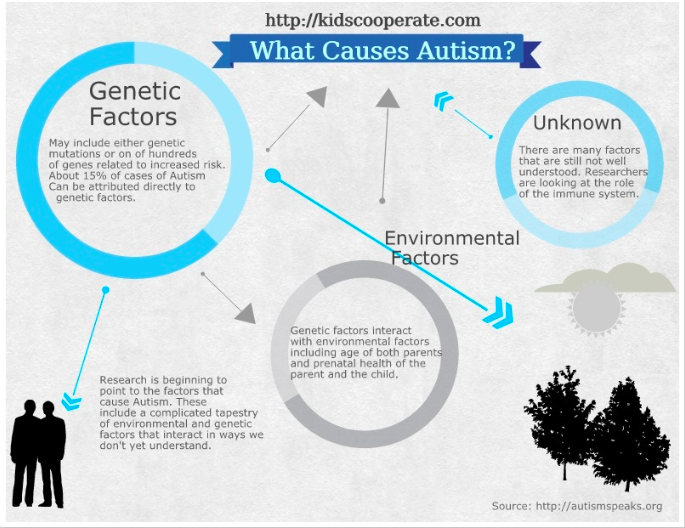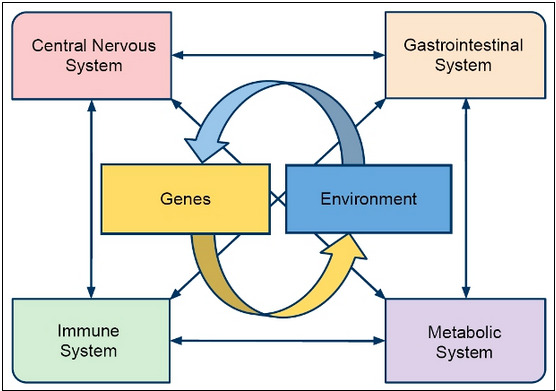Why the panic?
Autism and autism spectrum disorders (ASD) are becoming more prevalent as the years continue to pass, with about 1 in 68 children diagnosed with ASD. These alarming statistics are creating a sense of panic in some parents throughout the world, and many are seeking answers and preventative measures that they can take to decrease their child’s risk of developing autism.
What is autism, anyway?
Autism is defined as a neurodevelopmental disorder that involves an impairment of communication and social behavior, as well as various repetitive behaviors that are specific to an individual with autism. Autism has previously been linked with many different genes and some cases can be attributed to genetic changes and mutations. Most cases of autism are diagnosed by the age of 3 years, but scientists are starting to think that autism may be present at birth rather than develop as one ages outside of the womb. This emphasizes the importance of studying the factors that increase the risk of autism development prior to birth or prenatal environmental factors.
 Figure 1. Genetic and environmental factors play a role in autism development.
Figure 1. Genetic and environmental factors play a role in autism development.
My health = my child’s health
The heavy focus on investigating the array of genes that are involved with autism development has obscured the importance of researching the environmental factors that could potentially increase the risk of autism development, until now. Parents need to develop a general understanding of how they can influence the health of their children.
Scientists believe that the main environmental factors leading to an increased risk in autism development can be associated with two things: zinc deficiency and immune dysfunction.
Zinc’s fireworks show
Zinc deficiency increases the risk of autism development by increasing glutamate excitotoxicity within the brain. Glutamate excitotoxicity is comparable to a huge, dramatic fireworks show on the fourth of July, with all of the large fireworks being shot off continuously and rapidly, one after another. There is TOO MUCH excitatory signaling in the brain. This leads to an imbalance in excitation and inhibition within the brain, or irregular neuronal firing, influencing the improper neural development found in those with autism.
Immune dysfunctions can influence my brain?
Immune dysfunctions (illness, infection) lead to an increase in inflammation within the body via the rapid production of cytokines. This increased production of cytokines influences other vital signaling pathways involved with maintaining proper neural connections and firing within the brain. Similar to zinc deficiency, immune dysfunction ultimately leads to glutamate synapse dysfunction, or the improper connection and firing between glutamate neurons (neurons that release excitatory neurotransmitter glutamate). This involves the lack of proper development of glutamate synapses, as well as the lack of removal of glutamate synapses when they have been overproduced in the brain.
Prenatal Diet
Eating healthy is more important than many people realize for maintaining proper balances of various ions, metals, minerals, and nutrients within the body. This is particularly important when you’re pregnant and trying to grow a child.
Atypical eating can lead to both malnutrition and heavy-metal poisoning in the blood, both of which can lead to zinc deficiency. It is important to maintain a proper balance of copper and zinc in the body, because increases in copper (due to improper diet, heavy metal poisoning, etc.) lead to decreases in zinc (copper and zinc compete with each other). It is common for people on vegetarian and fiber-rich diets to become malnourished, thus leading to a zinc deficiency.
Prenatal Physical & Mental Health
Viral prenatal infections can directly alter the fetus immune system by elevating levels of cytokine production and causing inflammation, leading to glutamate synapse dysfunction.
Prenatal stress leads to an increase in cytokine production, leading to irregular signaling of various pathways in the brain, ultimately causing glutamate excitotoxicity within the brain (unnecessary, dangerous firework’s show).
Parental age also plays a role in fetal development and autism. It has been found that with increased parental age (especially paternal age), there are an increased number of mutations in the fetus that could lead to autism development. With increased maternal age comes increased complications during pregnancy and thus an increase in prenatal stress (described above). Increased maternal age is also linked with an increased risk of autoimmune disease, which could lead to increased inflammation and cytokine production, and thus abnormal fetal neural development.
 Figure 2. The interconnectedness of body systems, genetics, and environmental factors.
Figure 2. The interconnectedness of body systems, genetics, and environmental factors.
Is there something I can do?
100 people are diagnosed with ASD annually; so the question is, are there appropriate preventative measures that parents can take to decrease the risk of their children developing autism? Science points to YES, but it is important to keep in mind that as of October 2017, nothing is 100% guaranteed to be effective in preventing autism. There are many other factors influencing autism development that were not discussed in this blog post and some that are not discovered yet. This highlights the major need for the continuation of research on ASD and potential preventative efforts.
- DO NOT withhold your child from vaccinations (vaccinations DO NOT cause autism)!
- Take your physician-recommended prenatal vitamins (high in Zinc)!
- Eat healthy!
- Stay physically and mentally HEALTHY!
- Assess the risk of your age with a physician when planning to have children.
If you would like more information on the environmental factors proposed to increase autism development, please visit:
https://www.frontiersin.org/articles/10.3389/fpsyt.2012.00118/full
Images from:
https://www.dealwithautism.com/forum/threads/what-causes-autism-in-toddlers-and-children.699/
http://sphweb.bumc.bu.edu/otlt/mph-modules/ph/autism/autism_print.html
